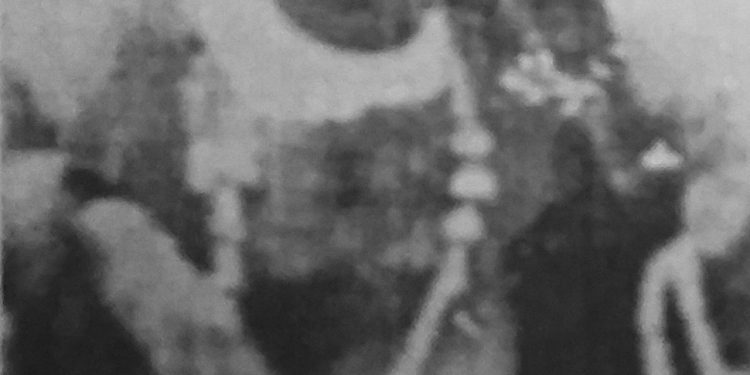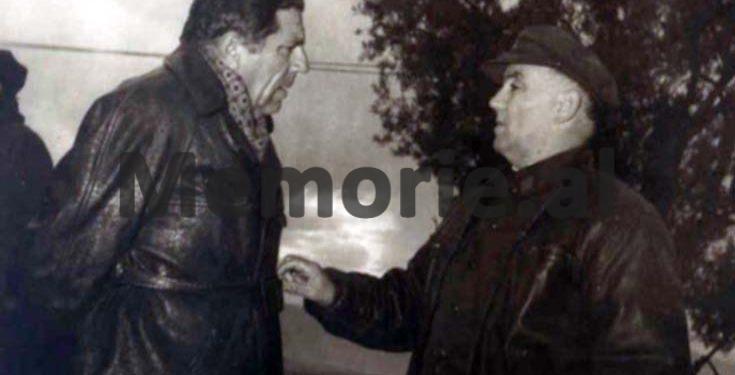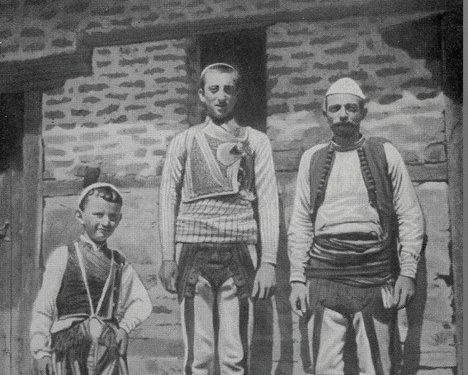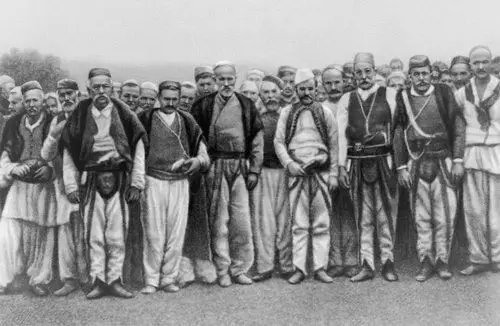By Caf Jonuz Çulaj
Memorie.al/ In addition to many others, the village of Aliaj of Kastrati in Malësia e Madhe, mentions three generations of fighters, distinguished for their clear minds and men, both known in this area.
These are: Shaban Elezi, Zenel Shabani and Islam Zeneli: grandfather, father and son.
Shaban Elezi, mentioned in the people of the area as a wise man and assemblyman, smart, great fighter at the head of comrades to protect the native lands from any danger, was therefore a well-known brave and distinguished breadwinner. The door of his house that they opened to numerous friends. His son, Zenel Shabani, followed his father’s example, he was known and appreciated by the people, but also by foreigners.
Tradition says that Prince Nikola of Montenegro, gathered his advisers and said: “Who prevents the Great Highlands from joining Montenegro”? After hearing their answer, Knjazi concluded: “Three influential houses are the main obstacles: the house of Çun Mulë, the mayor of Hoti and Zenel Shabani, the Vojvoda of Kastrati and Sokol Baci, the Vojvoda of Gruda”.
We are in the late nineteenth century and events are moving. Many historical figures rise and some even fall.
Kanga says:
“God, who has the first coach? / -Ded Gjo Luli, Zenel Shaban / Has Jakupin e Hysë Belanë / Mehmet Shpendin who stays in Shala”.
Islam Zeneli, Zeneli’s son and Shaban’s nephew, grew up in this patriotic environment. He acquired the national qualities and then developed them: the door of manhood, of bravery and wisdom, of hospitality remained open for the whole of the Great Highlands.
Islam Zeneli was born in 1905 and until 1919 he received his first lessons in the school of life, which was very difficult. It became more difficult when his father, Zeneli, died in 1919. Islam had to run the house with all the problems he had and contribute to his tribe, not only for him but also for all the fortunes of the homeland.
In July 1920, Yugoslavia invaded Albania. The people rose up in defense of the borders. The Albanian government gave its best and the people responded by leaving their houses and occupying the trenches of the country’s defense. He was only 15 years old, he led 100 armed men of Kastrati next to the Albanian army. Major Taip Shkodra, a great patriot of the time, who took part in the defense of the country, would write in his diary that: “Among the heroism shown by the highlanders, the 15-year-old son of Zenel Shabani u was distinguished”, so Islam Zeneli.
He spent the period until 1939 as an officer Kreshnik which means that he was a military cadre in reserve, but who deserved the honor as a career officer. As a nationalist, until 1939 he served in the ranks of the Albanian Army, as an anti-fascist, after 1939 he joined the Joint Front against the Italian and German foreign invaders. Many other patriots joined him. It was at the height of the forces and the others were going backwards. For this he had given examples, just like his predecessors.
He was anti-fascist, so he was against the foreign dictatorship, but he was also anti-communist, so against the internal dictatorship that was being installed with the help of foreigners. At his home in the fall, many nationalists gather to discuss the country’s future. Everything was in vain, as the fate of Albania had been decided in Yalta by the Great Powers (USA, England and BS).
There was a redistribution of the world, Albania remained in the East, which was not accepted by nationalist circles. In January 1945, the Koplik Movement broke out, and two weeks later (February 1945), anti-communist resistance took place in the Kelmendi area. After a year (September 1946) also in Postriba. All were extinguished by fire, 150 killed and 250 mountain prisoners, not counting the deportations to lifeless places.
Islam was arrested after the failure of the Postriba Movement. He endures torture, he endures prison. After his release, he returns home with the title “village kulak”. Since he was influential in Malësia, and since he was known to the highlanders across the border, the State Security asks him for cooperation, but he refuses. He was re-arrested in 1952, with the accusation: “Enemy of the People”.
Prison life began again. In 1956, he was in Shkodra prison, where Beqir Balluku comes to visit, accompanied by the chairman of the Shkodra Branch of Internal Affairs, Major General Hilmi Seiti. This conversation takes place in the presence of Islam, who would later testify:
Hilmi Seit: Comrade Minister, this is the kulak of Malësia e Madhe, Islam Zeneli. If he had listened to me, he would not be in prison now, but at home next to his family.
Beqir Balluku: (to Islam) It is true, what does Comrade Hilmi say?
Islam: (stands up, as if lazily, and after taking a serious look, responds) Maybe yes, Mr. Minister. But if I accepted the request of Mr. Hilmisa, so to spy on my brothers, I would need neither the living nor the life, much less the family, I would cut myself and my descendants, and even the graves of my ancestors.
The two high-ranking officials looked each other in the eye. Then Beqir Balluku said: “You have the place here and here you will leave the bones”. “It does not matter – Islam replied – it is enough to die as an honest Albanian.”
Beqir Balluku’s prophecy turned out to be almost true, because Islam continued to live in prisons and concentration camps for many years later.
Islam Zeneli or Uncle Islam, as his comrades called him, was for them a good teacher and a great educator, especially for the younger generation.
After his release from prison, he was interned in Zadrima (Hajmel). Five people, with a workforce in the village agricultural cooperative, with that ridiculous salary. How could they live on this income? Only he and others like him knew. Others, maybe not. He died in 1989, leaving behind his wife, two sons and a daughter. He was buried there and not in his native village. After 10 years, his remains were reburied in Bajza of Kastrati. The large presence of the people in this human ceremony shows the honor bestowed on them. /Memorie.al















